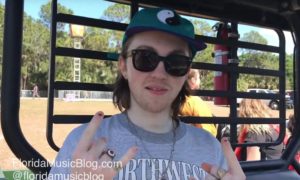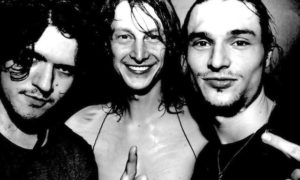
It’s been several years since Toubab Krewe made an appearance at Purple Hatter’s Ball so we jumped at the chance to get a face-to-face update from the band’s percussionist Luke Quaranta. We sat down with Luke pre-show at PHB and he gave us a detailed look inside the band’s recording process for their latest album Stylo. He also shared insight on the cultural aspects of West Africa, the place where Toubab draws much of their inspiration.
Read the interview below and get Stylo here.
Congratulations on your latest album, Stylo. This is the third studio album, correct?
It’s the third studio and then we had the full-length live album. We did our self-titled debut in 2005 and then we did the live record, Live at the Orange Peel, over New Year’s two nights in Asheville in 2009. In 2011, we put out TK2 which was the second studio album, third release. So it’s been awhile, seven years.
What parts of this album are your favorites – parts that make you think, ‘wow, we really nailed it’ or ‘we did something special here’?
The first single we put out, “That Damn Squash”, had that feeling for me. It was the first one we finished. It felt like a journey, kind of cinematic. It felt like it had its own story. It had a fresh sound for us. It was different than anything we’ve ever done. “Stylo” is also a really cool tune and has its own feel. It feels like island music. As the other tunes came together, we realized we had a nice full-length album. It was the perfect length for vinyl.
video via LiveforLiveMusic
The last song on the album “Southern Tracks” was a late edition. That felt like more of an ambient, psychedelic, brooding type of number. It felt like a nice way to end the album. It was actually a cool ode to the studio where we recorded it, Southern Tracks. They recently closed permanently. We were one of the last records cut there. It was a great studio.
The whole album sounded like a journey to me. Before listening to it I thought I knew what to expect, but every song had its twists and turns and yet still flowed. How close to the original Toubab sound would you say this album is? Do you try to stick to a particular sound or do you just roll with it as you go?
I wouldn’t say we try to stay true to the original sound, though I will say a lot of the record does sound like classic Toubab. It doesn’t sound like anyone else so that’s a cool thing.
I think we try to stay true to the process and the music we’re making is something we all are excited about. We’ve always let all our influences be equally present – all the West African influence as well as the traditional North Carolina music where Drew and Justin grew up.
The writing process was interesting. We had a number of writing sessions where we just played pretty freely. We experimented with different ideas. We recorded a lot of that stuff and distilled those jams and ideas into tunes.
Under what conditions does the band write the best? Do you guys write down ideas sporadically when you’re traveling or do you like a structured timeframe to create?
I think it’s a little bit of everything. We’re inspired when we’re listening to music together, traveling. We come up with ideas sometimes at sound check, sometimes in the van, sometimes hanging out. And on this one, we set aside time where we were just focused on writing and exploring ideas. All those things are inspiring.
We actually have some shows coming up in Colorado with a couple days in between. We’re going to grab an Air BNB and play acoustically to come up with ideas for the next album.
This album came together just by jamming and distilling those ideas down into songs. The post-production was a big part of it as well. We recorded the session in late 2014 and sat on it for a couple years. Then we came back to it with fresh ears and crafted the tunes with what we had recorded. Then we took creative license with how we mixed, edited and overdubbed it. It was definitely a mix of both time periods.
How have your travels to West Africa shaped you as person in addition to influencing your music?
It’s definitely a big part of the band’s identity and our friendships well before the band started. Drew, Justin and Teal, our original drummer, all grew up in Asheville. We met Dave not long after college. So we were all friends well before the band. We had taken a number of trips to West Africa at that point.
So you all initially went there just to travel?
We went there to learn music. We had all developed an interest in West African music during late high school and college years. After that, we started traveling to West Africa – Guinea, Ivory Coast and Mali. Through opportunity and connections we were able to stay with world-class teachers and their families and play music every day.
We also got into aspects of the culture that are an important part of the music. There are so many things about West Africa that shape you as a person. All those places we visited have an incredibly rich musical and traditional culture. They have a community of historians / musicians / storytellers called Djeli, or the French word Griot.
Kind of like our mountain folk music?
Yeah, exactly. It’s a big part of the spirituality. It’s an incredibly rich place culturally. It’s an amazing part of the world.
Tell us about some of the charity work the band is involved with.
We partnered with a non-profit called Instruments for Africa. We’ve raised quite a bit of money from our shows on the road. We got resources to one of our teachers to build a music school. Instruments for Africa does a lot of work putting on festivals all over the country – mostly in the northern part of the country where there’s been conflict in recent years.
You’re also involved with Seeds Program International. How did the partnership come about?
Seed Programs is based in Asheville, NC. They work with farmers in communities all over the world. They deliver seeds and farming expertise to places in need. Drew came up with the idea to do a seed box. We thought it would a cool idea to partner with them. We created a custom seed box with Seed Programs so when people buy the album they also buy a garden. It has eight seed varieties – one for each song on the album. A percentage of sales also goes to Seed Programs.
We’re at Purple Hatter’s Ball, which is a particularly special and unique festival at the park. Give us your history with this festival.
We did a Purple Hatter’s Ball back in 2015. We played the Campground Stage. I actually curated a day of programming there. Benyoro played, which is another band I play with. Rajaj Kassis’s HumanBeing played. Toubab Krewe played. Then the fourth set we did a big super jam with all the artists from all the groups. It included a number of Malian artists. That was the last time we were here. We’re psyched to back. This is a really special gathering.
That’s all the questions we had. Is there anything else we should mention?
Just check out the album. We pressed 300 vinyl albums for vinyl enthusiasts. We’ll be releasing more tour dates and new music soon for sure.







